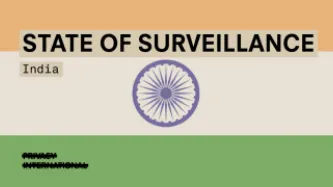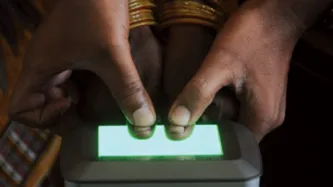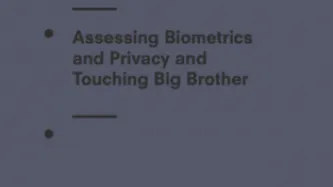Search
Content type: Impact Case Study
What happenedIn the aftermath of 9/11, Governments across the world rushed to legislate to expand surveillance. GovernmentsMoved to limit debate and reduce consultations as they legislated with speed.Created new systems to collect data on all travellers, for the purpose of profiling and risk scoring.Expanded identity schemes, and began demanding biometrics, particularly at borders.Developed financial surveillance mechanisms on an unprecedented scale.What we didFew non-governmental…
Content type: Impact Case Study
What happenedSince the late 1980s governments across the world have been trying to build identity registries. By the early 1990s, there were similar policies being pursued by a number of governments across the Pacific region, with similar technologies from the same companies. In the mid-90s ID cards became a ‘modern’ policy, implementing smart cards. By 9/11 biometric IDs became the preferred solution to undefinable problems. Then came vast databases of biometrics to identify people — with…
Content type: Examples
In 2015, the Swedish startup hub Epicenter began offering employees microchip implants that unlock doors, operate printers, and pay for food and drink. By 2017, about 150 of the 2,000 workers employed by the hub's more than 100 companies had accepted the implants. Epicenter is just one of a number of companies experimenting with this technology, which relies on Near Field Communication (NFC). The chips are biologically safe, but pose security and privacy issues by making it possible to track…
Content type: Examples
In 2017, a website run by the Jharkhand Directorate of Social Security leaked the personal details of over.1 million Aadhaar subscribers, most of them old age pensioners who had enabled automatic benefits payment into their bank accounts. Aadhaar is a 12-digit unique identification number issued to all Indian residents based on their biometric and demographic data. Both cyber security agencies and the Supreme Court have expressed concerns over its security,…
Content type: Long Read
Written by: Centre for Internet and Society
This guest piece was written by representatives of the Centre for Internet and Society (CIS). It does not necessarily reflect the views or position of Privacy International.
Introduction
As part of the State of the Surveillance project, CIS conducted a review of surveillance law, policy, projects, and trends in India. Below we provide a snap shot of key legal provisions governing surveillance in India and touch on…
Content type: News & Analysis
Below is an excerpt of an article that recently appeared on Slate, written by our partner Kevin Donovon, a researcher at the University of Cape Town, and Carly Nyst, Head of International Advocacy at Privacy International:
"Move over, mobile phones. There’s a new technological fix for poverty: biometric identification. Speaking at the World Bank on April 24, Nandan Nilekani, director of India’s universal identification scheme, promised that the project will be “transformational.” It “uses…
Content type: Report
This report investigates the probable effect of the proposed UK national Identity Card system on people who are marginalised, who suffer social disadvantage or exclusion, and those who are disabled. The work focuses on the biometrics element of the government’s proposals (specifically facial recognition, ngerprinting and iris scanning).
The Report provides a specific assessment of the recently published biometrics trial conducted by the UK Passport Service (UKPS), and compares these…
Content type: Press release
The London-based human rights watchdog Privacy International today attacked Justice Minister Donner's campaign on 'Wet op de uitgebreide identificatieplicht' as an "underhanded" attempt to convince innocent citizens to forego their legal rights.
Last year the organisation advised that the identity legislation would violate both the European Convention on Human Rights and the UN Declaration on the Rights of the Child.
Privacy International today warned that the identity campaign indicated that…
Content type: Press release
The London-based human rights watchdog Privacy International today warned that Justice Minister Donner's proposed 'Wet op de uitgebreide identificatieplicht' will violate the European Convention on Human Rights. The organisation has vowed to take legal action in the courts if the Parliament approves the proposals.
The proposed law will give a wide range of government and law enforcement officials the power to demand identification in the course of their duties. A penalty of €2,250 (US$2,…
Content type: News & Analysis
On July 3rd 2002, the UK Government published a consultation paper on a national identity card. Privacy International has investigated such proposals across the world for more than a decade. Here, we answer all the questions the government has failed to answer.
What sort of ID card does the government have in mind?
What is the difference between an "entitlement" card, and an identity card?
Will an identity card will help eliminate benefit fraud?
Will an identity card help prevent terrorism?
Is…
Content type: Report
The evolution of information technology is likely to result in intimate interdependence between humans and technology. This fusion has been characterized in popular science fiction as chip implantation. It is, however, more likely to take the form of biometric identification using such technologies as fingerprints, hand geometry and retina scanning.
Some applications of biometric identification technology are now cost-effective, reliable, and highly accurate. As a result, biometric systems are…
Content type: Report
Proposals for identity (ID) cards have provoked public outrage and political division in several countries. In this paper Simon Davies analyses the key elements of public opposition to ID Card schemes, and profiles the massive 1987 Australian campaign against a national ID card.









